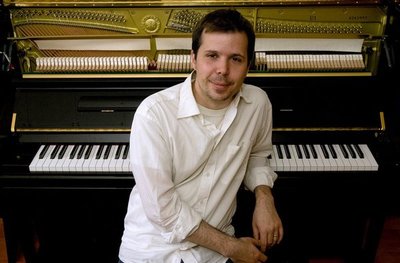April 29, 2010
Composer Huck Hodge, a musician since childhood, never considered another career
Thanks to this award, Hodge will spend a year in residence as the Luciano Berio Fellow in Music Composition at the Villa Aurelia, a palace built c. 1650 for Cardinal Girolamo Farnese. “It’s a time to concentrate on artistic and scholarly work,” Hodge said. “And also, you’re supposed to interact with all the other artists and scholars who are in residence.”
He is one of 33 scholars chosen as fellows this year. In addition to music, they come from fields such as ancient studies, architecture, literature and design. Hodge is particularly pleased to note that the visual artist William Kentridge will be an artist in residence as part of the program. That’s because Kentridge’s work was the inspiration for one of his compositions.
Kentridge, Hodge explains, is best known for his animated films. These are constructed by filming a drawing, making erasures and changes, and filming it again. A single drawing will be altered and filmed this way until the end of a scene.
“As the film’s motion takes place, there’s this blurred aura of the motion that just happened,” Hodge said. “I found that interesting and thought it suggested some ways of working musically where you take a melodic idea and the contour of the melody is picked up by other instruments and creates a similar aura.”
He used that technique for a piece called Parallaxes, which won the Gaudeamus Prize for composition in September of 2008. The competition for that prize is open to composers under 31, and the Gaudeamus Foundation (based in the Netherlands) received more than 400 entries from all over the world. As the honoree, Hodge received a commission for a new work that was performed during International Gaudeamus Music Week the following year.
Hodge has been making music since childhood and said he never really considered any other career. He started learning piano and clarinet at the age of 7 or 8 and soon was imitating the melodies he heard — everything from music on TV to the songs of the family’s parrot. Then he began composing his own music. In high school he played in jazz band, wind ensemble and orchestra and also sang in choirs.
“The first pieces I wrote that differed from common practice were written when I was about 15,” Hodge said.
By different, he means that he writes contemporary classical music, a type of music that he thinks is misunderstood.
“There’s some expectation in the minds of a lot of people that contemporary music today would sound similar to what they might have experienced in the ‘60s or ‘70s,” Hodge said. “Then, there was considerable interest in what’s known as serialism, or highly organized atonal music. Today that’s not the case anymore. I can’t think of anybody who still writes music that is as unrelenting in its dissonance and conceptual opacity as music from 30 years ago. So I think contemporary music itself is changing a lot.”
Hodge said his own music is “dissonant but with tonal centers” and that he is strongly influenced by Renaissance music, especially Italian music of the late 16th and early 17th century, which he calls “surprisingly dissonant.”
And dissonance is not a bad thing. “There’s a general conception of dissonance being harsh sounds, but actually, what creates musical expression is dissonance,” Hodge said. “If you have music that is purely consonant, it has a certain expressive affect, but to really get the sense of expressive meaning, you need dissonance to create ambiguity and a sense of motion.”
Hodge is a graduate of the University of Oregon, but he spent a substantial portion of his undergraduate years in Germany, where he studied computer music, theory and composition. He wanted to immerse himself in another culture, he said, and there’s more funding for contemporary music in Europe. He went on to graduate school at Columbia University, and has been at the UW since the fall of 2008, teaching mainly composition, music theory and orchestration. However, he’s not all about contemporary music. He’s studied the harpsichord and taught a class in Renaissance counterpoint. He also plays jazz and other types of improvisational music.
Still, he finds it gratifying when he’s able to pass on his main passion. “Some of my students came in not knowing much contemporary classical music,” he said, “and now after two years they’re very engaged in organizing concerts throughout the city, so that’s a really great feeling — to see that interest sparked to the point where they’re not just fulfilling assignments but really engaged in it.”
For the next year Hodge will be able to be fully engaged in composing as he enjoys his stay in Rome. In addition to that prize, he is the alternate for the Berlin Prize from the American Academy in Berlin. In the coming year, his music will be performed by ensembles in New York, Sydney, Amsterdam, Paris, Berlin, Rome and Seattle.
It will be a hectic year, but a satisfying one. Of composing, Hodge said, “I can’t think of anything I’d rather do. I really enjoy hearing interesting sounds and encoding different structures into an abstract, extremely logical system of just organized sounds. When I hear beautiful sounds arranged in a way that is somehow meaningful to me, that is one of the greatest things that I’ve ever experienced.”



